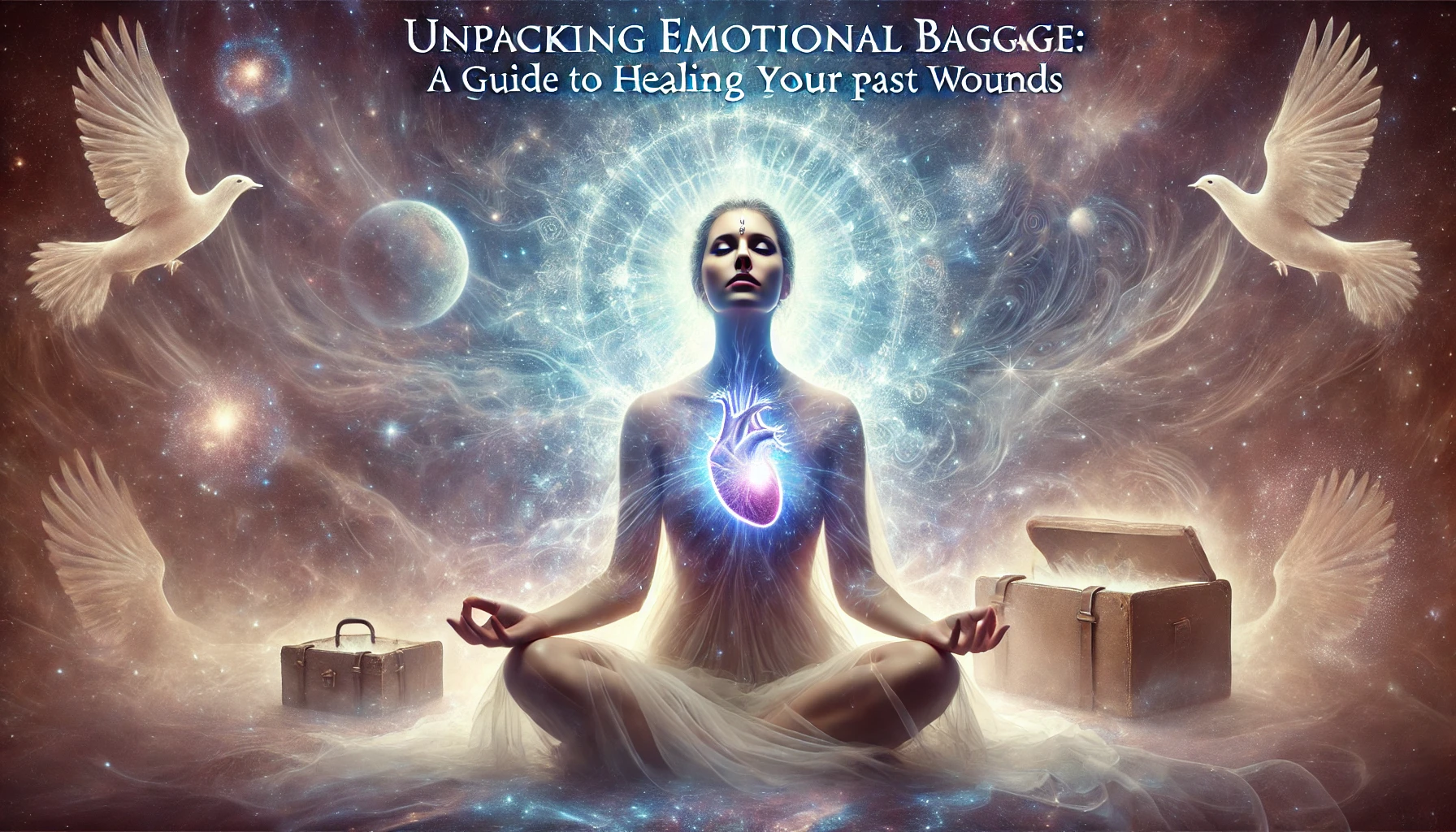
Unpacking Emotional Baggage: A Guide to Healing Your Past Wounds
Introduction: Explaining the concept of emotional baggage and its impact on our mental health
Imagine carrying around a heavy suitcase filled with all your past hurts, disappointments, and painful memories. This suitcase represents the emotional baggage that we accumulate throughout our lives, resulting from experiences that have left a mark on us. Just like physical baggage can weigh us down, our emotional baggage can impact our mental health and well-being.
Our emotional baggage is made up of unresolved emotions and negative beliefs that we carry with us, affecting how we view ourselves and others. It can manifest in various ways, such as feeling anxious, angry, or disconnected from our emotions. These emotional wounds take a toll on our mental health, leading to stress, depression, and relationship difficulties.
Understanding and addressing our emotional baggage is crucial for our overall well-being. By unpacking and healing these wounds of the past, we can free ourselves from the weight of our emotions and find greater peace and clarity in our lives.
- Why is emotional baggage important to address?
- It can lead to mental health issues such as anxiety and depression.
- It may influence our relationships and self-esteem.
- It can prevent us from living fully in the present moment.
- It can limit our ability to experience joy and happiness.
Through this guide, we will explore the origins of our emotional baggage, identify the different types of baggage we carry, and learn practical techniques to heal and release these emotional wounds. By taking the time to address our emotional baggage, we can cultivate a greater sense of self-awareness, inner peace, and emotional well-being.
Understanding the Origins of Your Emotional Baggage: Delving into Past Experiences
Our emotional baggage is like a heavy suitcase we carry with us wherever we go. It’s filled with memories, hurts, and wounds from our past that continue to impact our present. Understanding where this baggage comes from is the first step towards healing and letting go of the weight that holds us back.
- Childhood Experiences: Our childhood plays a significant role in shaping who we are today. Traumatic events, neglect, or lack of love and support during our formative years can create deep emotional wounds that stay with us into adulthood.
- Relationships: The relationships we have with our parents, siblings, friends, or romantic partners can also contribute to our emotional baggage. Betrayal, abandonment, or abuse in any form can leave lasting scars that affect how we interact with others in the present.
- Traumatic Events: One-time traumatic experiences such as accidents, loss of a loved one, or witnessing violence can leave a profound impact on our emotional well-being. These events can trigger anxiety, PTSD, or unresolved grief that lingers over time.
By delving into our past experiences, we can begin to unravel the threads of our emotional wounds and understand how they have shaped our beliefs, behaviors, and perceptions of the world. It’s like shining a light into the dark corners of our psyche, allowing us to make sense of our emotional struggles and patterns.
It’s important to approach this journey with self-compassion and curiosity, knowing that we are not defined by our past but empowered by our ability to learn and grow from it. Acknowledging the origins of our emotional baggage is a brave and necessary step towards healing and reclaiming our emotional well-being.
Identifying Different Types of Emotional Baggage: Recognizing Patterns and Triggers
Emotional baggage comes in many shapes and forms, and it can weigh us down in ways we may not even realize. It’s important to take the time to identify the different types of emotional baggage you may be carrying so that you can begin the healing process.
- Past Trauma: Traumatic events from your past can leave lasting emotional scars. These experiences can include abuse, neglect, or any other type of harmful behavior that has deeply impacted you.
- Unresolved Grief: The loss of a loved one, a relationship, or even a dream can create feelings of sadness and mourning that linger and turn into emotional baggage.
- Low Self-Worth: Negative beliefs about yourself, whether instilled by others or developed over time, can lead to feelings of inadequacy and unworthiness.
- Relationship Issues: Unhealthy relationships or breakups can create emotional wounds that manifest as trust issues, abandonment fears, or a fear of vulnerability.
- Self-Doubt: Constant self-criticism, fear of failure, or imposter syndrome can all contribute to emotional baggage that hinders your ability to thrive.
By recognizing these patterns and triggers, you can begin to understand the root causes of your emotional wounds. Pay attention to the situations, people, or thoughts that evoke strong emotional responses in you. These triggers can give you valuable insight into the areas where your emotional baggage lies.
It’s important to approach this process with self-compassion and understanding. Be gentle with yourself as you explore these deep-seated emotions and be willing to seek support if needed. Remember, acknowledging your emotional baggage is the first step towards healing and growth.
Practicing Self-Awareness: Tuning into Your Emotions
Self-awareness is the key to understanding how our emotions impact our behavior and overall mental health. It is about tuning inwards and recognizing the signals that our mind and body are sending us. By pausing and reflecting on our feelings, we can gain valuable insights into our thought patterns and reactions.
- Pause and Reflect: Take a moment to check in with yourself throughout the day. Notice how you are feeling and what may have triggered those emotions. Are you feeling anxious, stressed, or joyful? Understanding your emotional state can give you clues about what might be affecting your behavior.
- Practice Mindfulness: Mindfulness techniques, such as deep breathing or meditation, can help you stay present in the moment and observe your thoughts without judgment. This can help you become more aware of your emotions and how they are influencing your actions.
- Keep a Journal: Writing down your thoughts and feelings can be a powerful tool for self-awareness. You can track patterns in your emotions and behavior, helping you gain a deeper understanding of yourself over time.
- Seek Feedback: Trusted friends, family members, or therapists can provide valuable insight into your blind spots and help you see aspects of yourself that you may not have been aware of. Being open to feedback can help you grow and develop a greater sense of self-awareness.
By practicing self-awareness, you can start to unravel the layers of your emotional baggage and understand the root causes of your wounds. This self-reflection allows you to cultivate a deeper connection with yourself and take more control over your behaviors and choices. Remember, self-awareness is a journey, and it takes time to develop. Be patient and gentle with yourself as you embark on this process of healing and self-discovery.
Self-reflection exercises: Techniques for exploring your emotions and gaining insight into your thought patterns
Self-reflection is a powerful tool that can help you dive deep into your emotions and understand the why behind your actions. By taking the time to look inward, you can identify recurring patterns and triggers that may be fueling your emotional baggage.
- Journaling: Grab a notebook and pen and start writing down your thoughts and feelings. Reflect on past experiences, how they made you feel, and what lessons you’ve learned from them. Writing can help you make sense of your emotions and gain clarity on your innermost thoughts.
- Mindfulness meditation: Take a few moments each day to sit in silence and focus on your breath. Pay attention to your thoughts as they come and go, without judgment. Practicing mindfulness can help you become more aware of your emotions and how they impact your mental state.
- Emotional check-ins: Throughout the day, pause and ask yourself how you’re feeling. Are you feeling anxious, sad, or happy? By regularly checking in with yourself, you can track your emotional state and address any negative emotions before they escalate.
- Talk therapy: Consider speaking with a therapist or counselor who can help you explore your emotions in a safe and supportive environment. Therapy can provide you with valuable insights and tools to better understand and manage your emotional baggage.
Self-reflection exercises are not about finding quick fixes or solutions, but rather about developing a deeper understanding of yourself and your emotions. Remember, it’s okay to feel vulnerable and uncomfortable during this process. Be patient with yourself and allow yourself the time and space to explore your inner world.
Acceptance and Forgiveness
One of the most important steps in healing emotional wounds is accepting and forgiving ourselves and others for past hurts. This process can be challenging, but it is crucial for our mental health and well-being.
- Acceptance: Accepting what has happened in the past and acknowledging how it has impacted us is the first step towards healing. By acknowledging our emotions and experiences, we can begin to let go of the negative feelings that have been holding us back.
- Forgiveness: Forgiveness is not about excusing anyone’s actions or saying that what they did was okay. Instead, it is about releasing the resentment and anger we may have been holding onto. Forgiveness is a gift we give ourselves, allowing us to move forward without being weighed down by past grievances.
It is important to remember that acceptance and forgiveness are for our own benefit, not for anyone else’s. By letting go of negative emotions and releasing resentments, we free ourselves from the burden of carrying around emotional baggage.
It is okay to take your time with the process of acceptance and forgiveness. It is natural to feel resistance or hesitation, but remember that healing takes time and patience. Be gentle with yourself as you navigate these emotions and remember that it is a journey towards personal growth and healing.
As you practice acceptance and forgiveness, you may start to notice a lighter feeling within yourself. You may feel a sense of freedom and relief as you release the weight of past hurts. Remember that this is a positive step towards building a better relationship with yourself and treating yourself with kindness.
It is also important to seek support from trusted loved ones or professionals during this process. Having someone to talk to can provide valuable perspective and guidance as you work through your emotions and begin the journey towards healing.
By practicing acceptance and forgiveness, you are taking a proactive step towards letting go of the past and creating space for positivity and growth in your life.
Healing Techniques: Exploring Ways to Work Through Emotional Wounds
When it comes to healing emotional wounds, it’s important to find the right techniques that work best for you. There are several approaches you can explore to help process and release these unresolved emotions. Here are some effective strategies that can aid in your healing journey:
- Therapy: Seeking professional help from a therapist can provide you with the support and guidance needed to address underlying issues and work through emotional trauma.
- Meditation: Practicing mindfulness techniques can help you connect with your emotions, increase self-awareness, and promote relaxation and inner peace.
- Journaling: Writing down your thoughts and feelings in a journal can be a therapeutic way to process emotions, gain insight into your patterns of thought, and track your progress over time.
- Exercising: Engaging in physical activity can release endorphins, reduce stress, and improve your overall well-being, providing a healthy outlet for pent-up emotions.
It’s important to remember that healing is a gradual process, and it may take time to see results. Be patient with yourself and give these techniques a chance to make a positive impact on your mental health. Experiment with different methods, and don’t hesitate to seek support from professionals or loved ones along the way.
By incorporating these healing techniques into your daily routine, you can begin to unravel the layers of emotional baggage and start to rebuild a healthier mindset. Remember, it’s okay to ask for help and take the time you need to heal completely. Your emotional well-being is worth the effort, and by investing in your own healing, you are taking an important step towards a happier and more fulfilled life.
Setting Boundaries: Establishing Healthy Boundaries
When it comes to unpacking your emotional baggage and healing from past wounds, setting boundaries is an essential step in protecting yourself and allowing yourself to heal. Boundaries are like invisible lines that you draw to define what is acceptable and what is not in your relationships and interactions with others.
- Recognize your limits: It’s important to first identify your own limits and needs. What makes you feel uncomfortable or triggers negative emotions? Recognizing these triggers can help you establish boundaries to protect your emotional wellbeing.
- Communicate your boundaries: Once you’ve identified your limits, it’s vital to communicate them clearly to those around you. Whether it’s expressing your need for space, setting expectations in a relationship, or establishing personal boundaries, effective communication is key.
- Enforce your boundaries: Setting boundaries is one thing, but enforcing them is another. It’s crucial to uphold your boundaries and not allow others to overstep them. Saying no when you need to and standing firm on your limits is a form of self-respect.
- Respect others’ boundaries: Just as you expect others to respect your boundaries, it’s important to reciprocate that respect. Understanding and honoring the boundaries of others helps create healthy and mutually respectful relationships.
By setting boundaries, you create a safe space for yourself to heal and grow. You are taking control of your own emotional well-being and proactively preventing further harm. Remember, setting boundaries is not about building walls or shutting people out – it’s about creating healthy boundaries that foster a sense of security, respect, and understanding in your relationships.
Finding Support: Seeking Guidance During Your Healing Journey
Healing from emotional wounds can feel like a daunting task, especially if you try to go it alone. It’s important to remember that seeking support is not a sign of weakness but a necessary step towards healing and growth. Whether it’s through friends, family, or professionals, having a support system in place can make a world of difference in your healing journey.
- Friends and Family: Surrounding yourself with loved ones who understand and care about you can provide a sense of comfort and validation. Talking openly with friends and family members about your struggles can alleviate feelings of loneliness and isolation. They can offer a listening ear, empathy, and encouragement as you navigate the ups and downs of healing.
- Professional Help: Sometimes, seeking guidance from a therapist, counselor, or psychologist can be instrumental in unpacking deep-rooted emotional baggage. These trained professionals can offer unbiased perspectives, tools, and techniques to help you process your emotions, gain insight into your thought patterns, and develop coping strategies. It’s okay to ask for help from someone who has the expertise and experience to support you through your healing journey.
Remember, not all support has to come from traditional sources. Support groups, online communities, or spiritual advisors can also provide valuable insights and understanding as you work through your emotional baggage. The key is to find individuals or resources that resonate with you and make you feel heard and supported.
Ultimately, finding support is about building a network of individuals who can walk alongside you as you navigate the challenging terrain of healing. By reaching out and allowing others to support you, you are taking an empowering step towards self-care and self-love. Remember, you don’t have to face healing alone – there are people ready and willing to support you on your journey towards emotional wellness.
Cultivating Self-Love and Compassion
Practicing self-love and compassion is an essential part of the healing process when dealing with emotional baggage. It involves treating yourself with kindness, understanding, and acceptance as you navigate through your past struggles and wounds.
Self-care plays a vital role in nurturing your mental and emotional well-being. It can be as simple as taking time to rest and recharge, engaging in activities that bring you joy, or seeking professional help when needed. Prioritizing your own needs and boundaries is crucial in maintaining a healthy relationship with yourself.
- Start by acknowledging your worth and value as a person. You deserve love, respect, and compassion, even if you have made mistakes or experienced hurt in the past.
- Practice positive affirmations to cultivate self-esteem and confidence. Remind yourself of your strengths and capabilities, and celebrate your accomplishments no matter how small they may seem.
- Forgive yourself for any regrets or shortcomings you may hold onto. Understand that everyone makes mistakes and that it is part of the human experience to learn and grow from them.
- Take care of your physical health by eating nutritious foods, staying active, and getting enough rest. Your physical well-being is closely connected to your emotional health.
- Seek out activities that bring you inner peace and comfort, whether it be spending time in nature, practicing mindfulness or meditation, or indulging in a hobby that brings you joy.
Remember that self-love and compassion are ongoing practices that require patience and commitment. Be gentle with yourself as you navigate through the ups and downs of healing from emotional wounds. It’s okay to have bad days and setbacks, but always remember to treat yourself with the same compassion and understanding that you would offer to a loved one in a similar situation.
By cultivating self-love and compassion, you are building a solid foundation for healing and growth. You are worthy of forgiveness, acceptance, and happiness, and by giving yourself the care and kindness you deserve, you are paving the way for a brighter and healthier future.
Moving forward: Embracing growth and resilience
As you journey through unpacking your emotional baggage and healing from past wounds, it is important to remember that healing is not a linear process. It takes time, effort, and dedication to make meaningful progress towards emotional well-being. But as you navigate this path, it is crucial to embrace a mindset of growth and resilience.
- Growth: In order to heal, it is essential to continually strive for personal growth. This means being open to self-reflection, learning from past experiences, and evolving into the best version of yourself. Each challenge you overcome, each emotion you process, and each boundary you set is an opportunity for growth. Embrace these opportunities with an open heart and mind, knowing that each step forward brings you closer to emotional freedom.
- Resilience: Life is full of obstacles and setbacks, but resilience is the key to bouncing back stronger than before. In times of struggle, remind yourself of your inner strength and resilience. Draw upon past victories and moments of triumph to fuel your determination to overcome present challenges. Remember, your ability to persevere in the face of adversity is a testament to your resilience and courage.
By embracing a mindset of growth and resilience, you empower yourself to face the future with courage and optimism. Allow yourself to learn and grow from every experience, knowing that each moment brings an opportunity for personal development and healing. As you continue on this journey, may you find strength in your resilience and joy in your growth.
Conclusion: Reflecting on Your Journey of Unpacking Emotional Baggage
Congratulations on taking the brave step towards unpacking your emotional baggage and embarking on a journey of healing. It may not have been easy, but through self-reflection, acceptance, and courage, you have taken a significant stride towards living a more fulfilling and emotionally healthy life.
As you reflect on your experiences and the progress you have made, remember that healing is not a linear process. There may be setbacks along the way, but it’s important to be gentle with yourself and acknowledge the progress you have made thus far.
- Self-Awareness: By tuning into your emotions and understanding their influence on your behavior, you have already taken a crucial step towards healing. Continue to practice self-awareness and be mindful of how your emotions shape your interactions with others and yourself.
- Acceptance and Forgiveness: Embracing acceptance and forgiveness can be a powerful tool in letting go of past hurts and releasing negative emotions. Remember that forgiveness is a process, and it may take time to come to terms with past wounds.
- Healing Techniques: Explore various healing techniques such as therapy, meditation, journaling, and exercise to continue working through your emotional wounds. Find what works best for you and incorporate these practices into your daily routine.
As you move forward, remember that setting healthy boundaries, seeking support from trusted individuals, and cultivating self-love and compassion are essential components of your healing journey. Surround yourself with positivity and practice self-care to nurture your emotional well-being.
Finally, embrace a mindset of growth and resilience as you continue to heal and grow from your past experiences. Your journey of unpacking emotional baggage is an ongoing process, and each step you take brings you closer to a more emotionally healthy and fulfilling life.
Remember, you deserve love, understanding, and compassion – especially from yourself. Continue to empower yourself and prioritize your emotional well-being as you navigate the complexities of healing.
FAQs about Unpacking Your Emotional Baggage: Healing the Wounds of the Past
- Q: What is emotional baggage and how does it impact mental health?
A: Emotional baggage refers to unresolved emotions and past experiences that can weigh us down and negatively impact our mental health. - Q: How can I identify the origins of my emotional baggage?
A: By delving into past experiences and recognizing patterns that have contributed to your emotional wounds. - Q: What are some self-reflection exercises I can practice?
A: Techniques like journaling, meditation, and exploring your emotions can help in gaining insight into your thought patterns. - Q: Why is acceptance and forgiveness important in healing emotional wounds?
A: Acceptance and forgiveness help in letting go of negative emotions towards yourself and others, paving the way for healing. - Q: How can setting boundaries aid in the healing process?
A: Establishing healthy boundaries protects you from re-injury and allows you to prioritize your healing journey. - Q: What support can I seek while working through my emotional baggage?
A: Seeking guidance from trusted individuals or professionals can provide invaluable support during your healing journey. - Q: How can I cultivate self-love and compassion while unpacking my emotional baggage?
A: Practicing self-care and treating yourself with kindness helps in fostering self-love and compassion as you heal.
comments: 0




